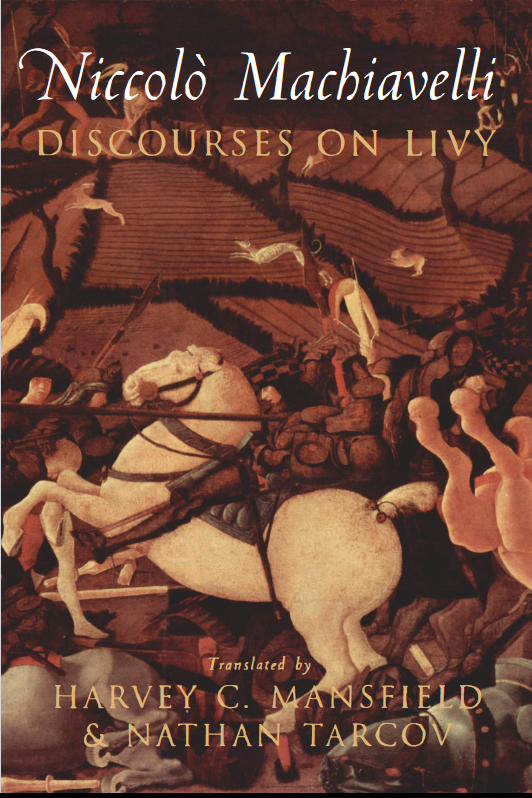Newly released
This book is new and will be uploaded as soon as it becomes available to us and if we secure the necessary publishing rights.

Discourses on Livy Book PDF
(0)
Author:
Niccolò MachiavelliNumber Of Reads:
72
Language:
English
Category:
fieldsSection:
Pages:
0
Quality:
excellent
Views:
985
Quate
Review
Save
Share
Book Description
Discourses on Livy is the founding document of modern republicanism, and Harvey C. Mansfield and Nathan Tarcov have provided the definitive English translation of this classic work. Faithful to the original Italian text, properly attentive to Machiavelli's idiom and subtlety of thought, it is eminently readable. With a substantial introduction, extensive explanatory notes, a glossary of key words, and an annotated index, the Discourses reveals Machiavelli's radical vision of a new science of politics, a vision of "new modes and orders" that continue to shape the modern ethos.
"[Machiavelli] found in Livy the means to inspire scholars for five centuries. Within the Discourses, often hidden and sometimes unintended by their author, lie the seeds of modern political thought. . [Mansfield and Tarcov's] translation is careful and idiomatic."—Peter Stothard, The Times
"Translated with painstaking accuracy—but also great readability."—Weekly Standard
"A model of contemporary scholarship and a brave effort at Machiavelli translation that allows the great Florentine to speak in his own voice."—Choice
"In thiS mtroductlon we offer a quick tour through Machiavelli's DIscourses on Dvy. We shall mark the four-star attractions that tourists will want to visit repeatedly and wish to remember. The great Machiavellian themes of polt tics, morality, fortune, necessity, and religion will be set forth, together with the controversies they have touched off. For Machiavelli, to say the least, did not wnte m such a mode as to prevent dispute about what he said. We consider the fact that Machiavelli wrote at the same time two very different books on the whole of polttiCS, The Pnnce and the Discourses. We provide a brief appraisal of the latrer's schoLrrly reputation today as the first source of clasSical republi canism, as the recollectlOn of ancient liberty that calls us to venture from the settled and secure realm of property and self-interest. And we present Machia velli himself, not a disengaged phtlosopher but the instigator m the schemes he advised, an actor in hiS own enterprise of bringing "new modes and orders ... for the common benefit of everyone" (D I pro I). As befits an introduction, we try to speak with both modesty and authority."
Niccolò Machiavelli
Niccolò di Bernardo dei Machiavelli (Italian 3 May 1469 – 21 June 1527), occasionally rendered in English as Nicholas Machiavel,was an Italian diplomat, author, philosopher and historian who lived during the Renaissance. He is best known for his political treatise The Prince (Il Principe), written in about 1513 but not published until 1532.He has often been called the father of modern political philosophy and political science.For many years he served as a senior official in the Florentine Republic with responsibilities in diplomatic and military affairs. He wrote comedies, carnival songs, and poetry. His personal correspondence is also important to historians and scholars of Italian correspondence.He worked as secretary to the Second Chancery of the Republic of Florence from 1498 to 1512, when the Medici were out of power.Machiavelli's name came to evoke unscrupulous acts of the sort he advised most famously in his work, The Prince.He claimed that his experience and reading of history showed him that politics have always been played with deception, treachery, and crime.He also notably said that a ruler who is establishing a kingdom or a republic, and is criticized for his deeds, including violence, should be excused when the intention and the result is beneficial to him.Machiavelli's Prince has been surrounded by controversy since its release. Some considered it to be a straightforward description of the evil means used by bad rulers; many read in it evil recommendations to tyrants to help them maintain their power.Even into recent times, some scholars, such as Leo Strauss, have restated the traditional opinion that Machiavelli was a "teacher of evil".The term Machiavellian often connotes political deceit, deviousness, and realpolitik. Even though Machiavelli has become most famous for his work on principalities, scholars also give attention to the exhortations in his other works of political philosophy. While much less well known than The Prince, the Discourses on Livy (composed c. 1517) has been said to have paved the way of modern republicanism.It has also significantly influenced authors who have attempted to revive classical republicanism,including Hannah Arendt
Book Currently Unavailable
This book is currently unavailable for publication. We obtained it under a Creative Commons license, but the author or publisher has not granted permission to publish it.
Rate Now
5 Stars
4 Stars
3 Stars
2 Stars
1 Stars
Discourses on Livy Quotes
Top Rated
Latest
Quate
Be the first to leave a quote and earn 10 points
instead of 3
Comments
Be the first to leave a comment and earn 5 points
instead of 3